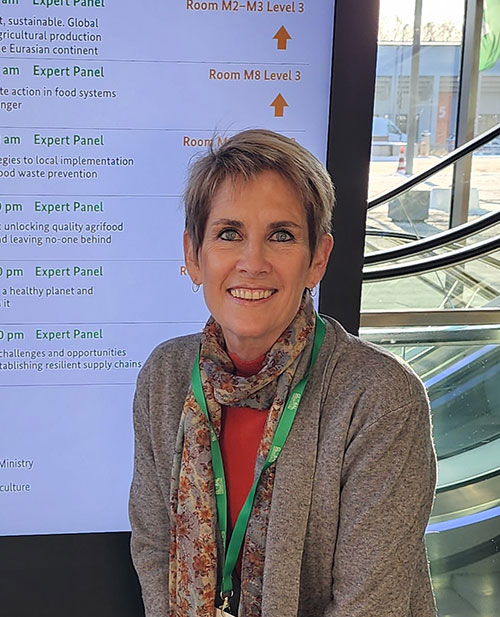“Governments and regulations change frequently"
Agricultural entrepreneur Isabel Lizaso on the status quo and prospects for agriculture in South America.
The Global Forum for Food and Agriculture (GFFA), an important international conference on key issues for the future of global agriculture and food policy, is being held alongside the Green Week in Berlin. The GFFA offers the opportunity to look beyond the horizon and engage in dialogue with experts from the world of agriculture.
In this interview, Isabel Maria Lizaso, agricultural entrepreneur from Argentina and member of the Association of Direct Seed Producers in the South American country, gives an insight into the interaction between agriculture and politics there and into sustainability objectives. The DLG (German Agricultural Society) is a member of the GFFA.
What are the biggest challenges to making the value chain for agricultural products in Argentina more resilient and sustainable?
Isabel Maria Lizaso: One of the biggest hurdles lies in the political system itself, which is unstable and characterised by many changes. As a result, the regulations for the agricultural sector change frequently. There are also economic uncertainties: High inflation in Argentina is a general problem. This is a difficult environment for farmers to make long-term plans. This is intensified by the fact that many producers farm on leased land and leases are generally only concluded for one year.
That does indeed sound like difficult conditions. Do farmers in this environment even have the opportunity to focus intensively on sustainability?
Sure, it's not easy. Ultimately, these are the conditions under which we farmers in Argentina have been working for around 20 years. And yet, in our association for no-till producers, Aapresid, we are strongly committed to our most valuable resource, the soil. Almost 90 per cent of farmers in Argentina use no-till farming. Almost 15 per cent of producers grow cover crops or catch crops to cover the soil all year round. This demonstrably improves soil health and binds CO2.
The cultivation of catch crops and soil health in general are also becoming increasingly important in EU agricultural policy. However, the expansion of crop rotation to include catch crops and other sustainable cultivation methods need time to develop their optimum effect. With one-year leases, this is certainly a major challenge for farmers...
That is correct. That's why, as an Aapresid member, I'm all the more pleased that our growers still use these methods to such a high degree. This is simply based on the deep conviction that the soil is our most valuable resource - and a basic prerequisite for sustainably successful agriculture. We also rely on successful networking in order to farm sustainably.
How exactly?
Aapresid has set up a Pest Management Network (PMN) for pest control. In this network, farmers, experts and companies from the agricultural sector continuously exchange information on new resistance or control strategies for pests and draw on monitoring and supra-regionally networked databases. In our Carbon Network, we exchange information on methods to bind as much CO2 as possible in the soil and thus reduce greenhouse gas emissions in agriculture.
Politicians and trading partners from the EU are placing growing demands on sustainability in agriculture, which also increasingly affects the sustainable production of imported goods. The measures discussed as part of the EU's Green Deal climate protection and sustainability programme are a good example of this. In your experience, how is agriculture in Argentina adapting to this?
In our association, we developed a certificate in 2008 that measures high environmental and social standards in agricultural production and makes them transparent. The seal is called Certified Sustainable Agriculture, or CSA for short, and is recognised by the International Trade Centre (ITC) and the EU umbrella organisation for compound feed producers, Fefac, among others. So this topic has been on our agenda for much longer than the discussions about the Green Deal in the EU. Incidentally, in the EU and also in other parts of the world, I think there is an important basic requirement to be considered in the discussion about sustainability in agriculture, which unfortunately is not always sufficiently taken to heart...
And that is?
Farmers must be involved from the outset in the development of new laws and political objectives and guidelines relating to sustainability. Ultimately, producers must be fully consulted in all agricultural policy decisions. After all, they are the experts in agricultural production and know best the natural conditions under which they work. The protection of natural resources is in their own best interests.
How do you assess the future prospects for agriculture in Argentina?
We have had a new government for about a month now. Although this government has only just started, it has put together what I consider to be a capable team in terms of agricultural policy. That gives me hope.

